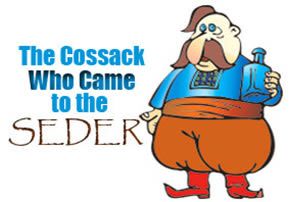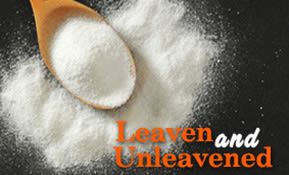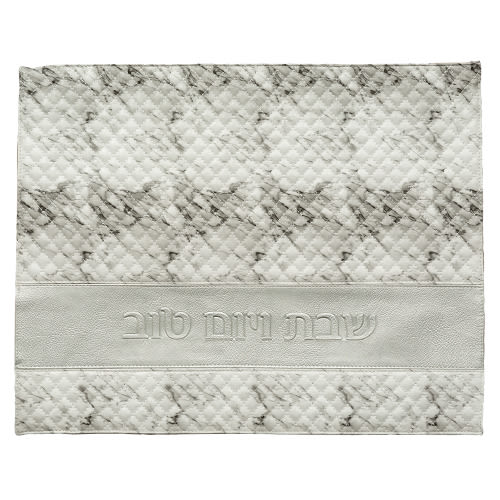
The Cossack Who Came to the Seder
The fish stuck in Reb Feivel's throat and he barely even tasted the soup. But by the time the chicken was served, Reb Feivel had come up with an idea...

Reb Tzvi Elimelech of Dinov, author of Bnei Yissaschar, was a chassid of the illustrious Chozeh of Lublin, yet he never forgot the tremendous debt he owed to his first teacher: his father, a simple but pious melamed (teacher) by the name of Reb Feivel.
Like many a poor Jew, every year Reb Feivel would hire himself out as a melamed to a household where there was more wealth than learning. The melamed would stay at his wealthy employer's home during the months in between Sukkot and Pesach, and the money he earned would have to last his own family for the entire year.
One year, Reb Feivel arrived at the home of his new employer just before Shabbat. He quickly made his preparations for the holy day, and after joining the town's congregation for the evening prayers he took his place at the table.
The poor melamed noted that no expense had been spared in honor of Shabbat. The table was laden with heavy silver candlesticks that gleamed impressively and sparkling crystal goblets that bespoke an exceptionally high quality of craftsmanship. The family members were all dressed in their finest clothes, which were very fine indeed. And from the kitchen came the tantalizing smells of various delicacies that had been prepared in honor of the holy day. In fact, only one thing was missing to make the picture complete and the melamed could not help but express his surprise.
"Where are the guests for Shabbat?" Reb Feivel asked his wealthy employer.
"I don't waste money on guests," the rich man replied.
Reb Feivel was in shock. Shabbat without guests? He had never heard of such a thing. Where he came from, people vied with one another for the privilege of having poor folk for Shabbat.
The fish stuck in Reb Feivel's throat and he barely even tasted the soup. But by the time the chicken was served, Reb Feivel had come up with an idea.
"I cannot stay at a home where there are no poor people at the Shabbat table," Reb Feivel told the wealthy man. "Therefore, please deduct the expense from salary."
His employer readily agreed to this "business proposition" and from that time on there were guests at the rich man's table every Shabbat.
Reb Feivel performed his teaching duties with great diligence and his employer seemed to be satisfied with his efforts. After Shabbat HaGadol, the Shabbat that precedes Pesach, the melamed approached the rich man and asked him for his wages so that he could return home and help his family prepare for Pesach.
"What wages?" the rich man asked.
"The money you owe me for tutoring your sons," Reb Feivel replied.
"I don't owe you a thing," the rich man said. "Your salary of 500 rubles didn't even begin to cover the expense of feeding the poor guests every Shabbat. I had to spend twice that amount, so it is you who owe me 500 rubles."
Reb Feivel tried various arguments to show the rich man the error of his thinking, but the man refused to budge. When he saw that he was not going to get his money, Reb Feivel went to quickly pack up his things.
The melamed's heart was heavy as he trudged down the muddy road. He knew that his wife was counting on those 500 rubles to pay off the bills at the butcher and the grocer. And then there were all the things they would need to buy for the holiday. How could he tell his wife that he had come home without a single ruble in his pocket?
When Reb Feivel arrived at his village, it was already late at night. As he didn't have the courage to go straight home, he decided to spend the night in the synagogue instead. He tried to learn some Torah, but his spirits were so low that he could not properly concentrate. He kept drifting off into an uneasy sleep, and his heart was no lighter when the dawn began to break.
The townspeople began to arrive at the shul for the morning prayers, and they all greeted Reb Feivel heartily. Among the people who came to daven was Reb Feivel's son, Reb Tzvi Elimelech, who was just a boy of seven at that time. The little boy, of course, was ecstatic to see his father and so he ran up to give Reb Feivel a big hug.
"Tati, I'm so happy you're home," the little boy cried. "We haven't had anything to eat for weeks except for a few black potatoes because no one will let us buy on credit anymore. I must tell Mama that you're finally back."
Before Reb Feivel could stop him, the little boy ran out of the synagogue to tell his mother the good news. Within a few minutes the boy came back, and from the way his eyes sparkled, it was clear that he was greatly excited.
"Mama is going straight to the storekeepers to tell them they'll get their money today," the boy whispered to his father. "Then she is going to fix you the biggest breakfast ever for when you come home from shul."
Poor Reb Feivel didn't know what to do. He lingered over his davening as long as he could, and it seemed to the boy that his father was taking forever to wrap up his tallit and tefillin.
"Tati, let's go home," the boy pleaded impatiently.
"Let me just straighten up these books," Reb Feivel said, trying to find yet one more excuse to delay his homecoming.
At last there was nothing left to do except go home. Although he knew that he had to break the news to his wife at some point, Reb Feivel was still in no hurry to do so. And so even though the boy kept tugging at his father's coat sleeve to pull him along, Reb Feivel just as insistently kept dragging his feet.
Now there was only one more corner to turn until they would reach their little house. Reb Feivel took a deep breath and prepared himself to greet his wife.
"Run along and tell your mother I'm coming," Reb Feivel said to the boy.
Reb Tzvi Elimelech was just about to dart ahead when he was stopped by the sound of a thunderous clamor. Out of nowhere a horse came galloping down the street. Sitting on top of the horse was a fierce looking Cossack, and so of course the little boy had to stop and look.
"Where's Reb Feivel?" the Cossack growled.
"I am Reb Feivel," the melamed replied.
The Cossack then threw a leather pouch at Reb Feivel's feet and galloped off. Reb Feivel stooped down to pick up the bag. He could tell by its weight that there was something heavy inside. Yet even so, he was totally unprepared for what he saw when he opened the bag.
"Tati, there are gold coins inside!" Reb Tzvi Elimelech cried out excitedly. "Come, let's tell Mama!"
With a bag full of gold coins in hand, Reb Feivel no longer had to be pulled along by his son. He and his family had a joyous reunion, and they immensely enjoyed the big breakfast his wife had prepared. When they were all quite satisfied from the delicious food, they happily began to prepare for the holiday.
That Seder night, little Reb Tzvi Elimelech was so excited that he didn't drift off to sleep even once. Even though the hour was very late, when the time came to greet Eliyahu Hanavi (Elijah the Prophet), who comes to visit every Seder and will one day come to announce the Final Redemption, the little boy went with his father to open the door.
Reb Feivel was about to recite the section of the Haggadah that says, "Pour out Your wrath," when the child gave out a loud shriek.
Standing outside their door was a man in a uniform. The child was about to run and hide behind his father when he noticed that the fierce look of the soldier had been replaced with a warm smile.
"Tati, look," Reb Tzvi Elimelech exclaimed joyfully, "the Cossack has come to our Seder!"
***
Libi Astaire is the author of Choose Light! Chassidic Tales for Chanukah, Rosh Hashanah, Sukkos, Passover & Shavuos; Breakfast with Rav Zusha and Other Stories to Wake Up Your Soul; and the award-winning Jewish Regency Mystery Series. Visit her website for more information about these and other books.











Tell us what you think!
Thank you for your comment!
It will be published after approval by the Editor.